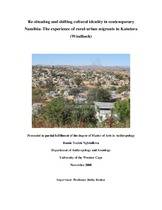Re-situating and shifting cultural identity in contemporary Namibia: the experience of rural-urban migrants in Katutura (Windhoek)
Abstract
This thesis explores the shifting cultural identities of young Owambo migrants living in Babilon, an informal settlement on the outskirts of Windhoek, Namibia. Through an investigation of their social, cultural and economic lives, I show how these young people invoke their Owambo-ness, but how they also transcend their ethnic identifications through engaging in an emerging Namibian youth culture, which cuts across rural-urban, ethnic, and socio-economic divides. I argue that young migrants from Ovamboland, who intend to escape their poverty stricken rural homes and arrive on packed busses, bringing with them few possessions and great expectations, constantly shift and resituate their cultural identities while trying to make a living in the city. These young people are eager to engage fully in a better life and hope to find employment in the urban economy. For many, however, this remains just that - hope. In their daily lives, the young migrants replicate, reproduce and represent rural Owambo within the urban space. Using the examples of 'traditional' food and small-scale urban agriculture, I explore how their ideas of Owambo-ness are imagined, enforced and lived in Babilon. I argue that although migrants identify themselves in many ways with their rural homes, and retain rural values and practices to a large extent, this does not mean that they would remain "tribesmen", as earlier, how classic studies in Southern African urban anthropology argued (Mayer 1961; Wilson and Mafeje 1963). They also appropriate "ideologies" and practices of the emerging Namibian youth culture, especially popular local music and cell phones. My study thus shows that the migrants develop multiple, fluid identities (with reference to Bank 2002); they identify concurrently with the urban and the rural and develop a synthesis of both. The thesis is based on ethnographic research, which was conducted between February and May 2008. During the fieldwork, I engaged daily in informal discussions with many residents of Babilon, and carried out life history interviews, focus group discussions, and in-depth interviews with key research participants.

